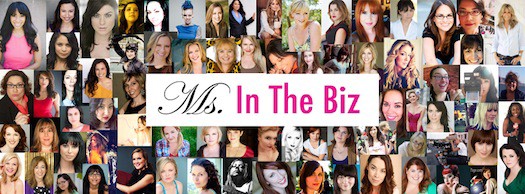Helenna Santos-Levy launched her online magazine, Ms. in the Biz, just six months ago, with the
simple goal of connecting women working in Hollywood with one another. Today it
has 61,000 readers in 151 different countries. The magazine, which is written
by industry professionals for industry professionals, covers a range of topics
from career tips to fitness, wellness, beauty and fashion to practical tips on
using social media, auditioning, and becoming a repeat-hire.
Santos-Levy has clearly tapped into a need among women in
Hollywood to come together and share their stories, both of the obstacles they
face and of how they are successfully getting past them. The difficulty of both
recognizing systemic problems and not letting them hold you back was the topic
of conversation at Ms. in the Biz’s first public event: a panel of actors,
managers, casting directors, directors and producers entitled: Navigating
Hollywood’s Cutthroat Corners: How to Thrive as a Woman in Entertainment.
Though the panelists agreed that the statistics for women in
film are dismal — from 2002–2012, only 4.4%
of the directors of top 100 box office movies were women — they disagreed on
specific ways to address sexism in the field, leading to a genuinely lively conversation.
Though JoBeth Williams (Veteran Actor and SAG Foundation President) suggested
that a return to character-driven dramas would be better for women actors that
the current emphasis on “fighting movies.” Erin Stam (Executive
Producer, 27 Dresses) offered, “We’ve
got think about crossing every genre. We’ve got to say we can make Gravity, we
can blow things up, and we can make character dramas. We can do everything.”
When the younger producers encouraged everyone to be a “multi-hyphenate”
(actor-writer-producer-director), Williams reminded a struggling audience-member
that when you spread yourself too thin you are in danger of losing touch with
the very creative passion that drives you. Liz York (Talent Manager, Principal
Entertainment), who once had a client call from a TV set where a director had
just asked her to suck in her stomach, suggested that as women we have to stick
together to make saying such things unacceptable. On the other hand, Katt Shea,
who once had her own special effects supervisor tell her he had to wait for the
director to start a meeting (she was the director), urged women to let moments
like that pass.
Agreement did emerge that “navigating
the cutthroat corners of Hollywood” is a matter of having faith in
yourself, a passion for making things, and a savvy business sensibility that
both turns your passion into your brand and serves to remind you that getting
rejected in this town is almost never personal. JoBeth Williams advised the
actors in the room: “You have to be a business person, and it’s very
hard because one of the reasons that we’re actors is because we’re sensitive,
because we’re emotional and we have these rich emotional lives. And so when we
walk in and we audition, we’re putting our little emotional, jelly-like selves
out there, and so every time you don’t get hired you’re crushed. And the only
way I have found to combat that is to remind yourself that it is a business and
you are a business property and you are trying to sell a property. So put it
out there, and if they don’t like it, fuck ’em. Move on.”
The spirit of the panel, which
Santos-Levy introduced by comparing it to The View, was more
inspirational than practical, with women on the panel and in the audience
agreeing vociferously with calls for women in the industry to support one
another and love themselves. When several women of color in the audience
were urged, in response to questions about navigating racial issues, to simply
have more faith in themselves, I was reminded of Sheryl Sandberg’s Lean In philosophy that it is not
structural inequality but an absence of confidence that keeps women from being
successful in business. It is not uncommon in Los Angeles, where everybody has
a dream, to hear that success is merely a matter of will power, but that point
of view ignores systemic disadvantages to the poor, the non-heteronormative,
and people of color as well as to women.
I spoke with Santos-Levy, who plans to continue the
conversation online and in future panels, including one on diversity. Her goal, she said, is “to find holes
in what’s offered for women in the business, have more really frank
conversations about what’s happening,” and share practical advice on
solving problems for women in the industry. In the meantime, like Lean
In, Ms. in the Biz is having a perhaps inadvertent impact on the system
by enticing and enlightening male readers who are inspired to form new
partnerships and hire more women. As one male audience member at the panel
shared, “I’ve got to say that I feel like I’ve just walked in on gold. It’s
amazing what all of you are saying, and when I leave here I’m gonna tell
people, ‘You’ve got to hear what I heard today.”






